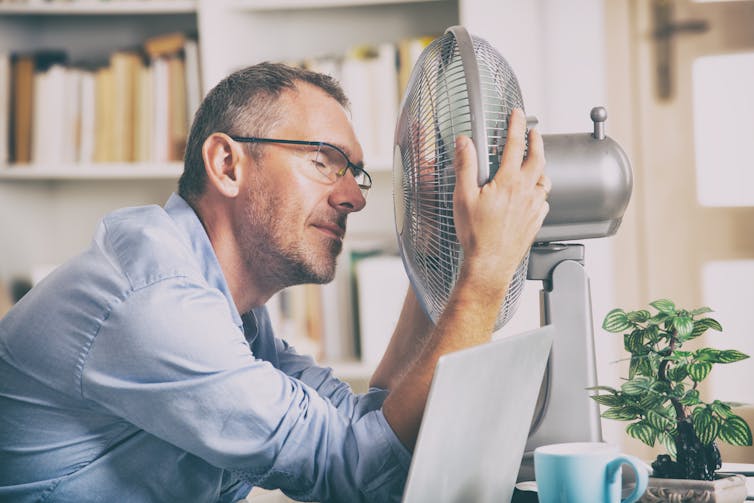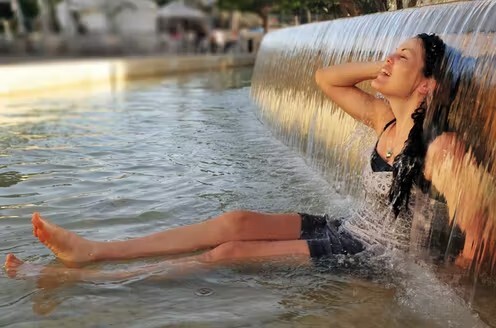We spend most of the year complaining that Britain is too cold and wet but gripe with just as much enthusiasm about the heat.
Although moaning about the weather is satisfying, it’s better to take action and cool yourself down.
You need to take extra care in the UK when temperatures hit 24℃ as this is when heat illness and deaths start increasing.
Being too hot makes you unwell and can even kill you. Some people are more vulnerable to heat. People over 65, under five, pregnant women, those with medical conditions (such as heart disease and mental health conditions) and those who work outside need extra protection in hot weather. You can increase your tolerance to heat if you acclimatise slowly over time.
Stay cool
Research shows that putting your feet in cold water is a good way to reduce core body temperature and keep your organs working. It will also help reduce swelling in your ankles and feet.
However, having a lukewarm shower or bath will cool you down faster and is the most effective way to cool down. Don’t be tempted to soak in freezing cold water as cold shock can be dangerous. In drought conditions, conserve water and concentrate on cooling either your feet, hands or neck and face.
The refreshing breeze from an air fan against your skin might feel good but it does not always cool you down. Fans can actually make you feel worse, especially in dry heat conditions, speeding up dehydration and heat illnesses. The guidance from the World Health Organization is that using a fan above in temperatures above 35°C will not reduce your chance of getting heat exhaustion and heatstroke.

Air fans won’t stop you getting heat stroke. Shutterstock
It is important to stay hydrated and replenish the minerals we lose when we sweat. On average in very hot conditions (high 30s) we sweat 3-4 litres per hour and up to 10 litres a day, the same as 40 cups of tea. For a short amount of time, hot drinks raise your core body temperature. But it induces sweating, which then lowers your temperature. Cold and ice drinks do cool you down too. It’s thought hot drinks might be slightly more effective than cold. Whatever the temperature, drink lots of fluid.
Another way to beat the heat is wild swimming. But be aware of cold shock. Slowly submerge your body in the water, understand the limits of your swimming ability and the rules about where it is safe to swim, because many people drown in hot weather.
Urban design
Those clammy, sleepness nights in a heatwave can leave you wondering if it’s time to raid the savings and install air conditioning. The heat can be especially bad in cities, which create urban heat islands (a metropolitan area a lot warmer than surrounding rural spaces). But there is a solution that’s gentler on your energy bill.
Green walls and roofs not only look pretty but can cool the buildings beneath them by as much as 12℃, while green walls can be up to 32℃ cooler than conventional walls and save 59% of energy costs as well as providing sound insulation.

A green wall can help cool buildings down. Shutterstock
They have blossomed in London boroughs where they have been made part of local planning policy since 2008. They cool flat-roofed buildings in summer and insulate them in winter, reduce the risk of flooding by soaking up rainwater, filter air pollution and provide refuges for rare and threatened wildlife – which can struggle with the heat too.
Animals and heat
Leaving fresh water dishes in your garden or balcony can make all the difference for wild animals. Birds and hedgehogs will appreciate food you put out for them any time of year but during the summer the ground can harden, making it harder to forage. Plants also suffer in heat. You can help by learning when the best time to water them is.
And watch out for pets. Do not leave them (or people) in cars. It is best to walk pets in the morning or evening when the pavement and ground surface is cooler.
Climate change is driving a rise in heatwaves. One study showed that someone born in 1960 is on average likely to experience around four heatwaves, whereas someone born in 2020 is likely to experience 30 heatwaves with 1.5°C warming. We have a 50% chance of hitting this level in the next ten years.
So protecting yourself from heat may seem like common sense, but it could be the difference between life and death.



 NASA Astronauts Wilmore and Williams Recover After Boeing Starliner Delay
NASA Astronauts Wilmore and Williams Recover After Boeing Starliner Delay  FDA Lifts REMS Requirement for CAR-T Cell Cancer Therapies
FDA Lifts REMS Requirement for CAR-T Cell Cancer Therapies  Neuren Pharmaceuticals Surges on U.S. Patent Win for Rare Disorder Drug
Neuren Pharmaceuticals Surges on U.S. Patent Win for Rare Disorder Drug  SpaceX Prioritizes Moon Mission Before Mars as Starship Development Accelerates
SpaceX Prioritizes Moon Mission Before Mars as Starship Development Accelerates  SpaceX Starship Test Flight Reaches New Heights but Ends in Setback
SpaceX Starship Test Flight Reaches New Heights but Ends in Setback  NASA Cuts Boeing Starliner Missions as SpaceX Pulls Ahead
NASA Cuts Boeing Starliner Missions as SpaceX Pulls Ahead  Blue Origin’s New Glenn Achieves Breakthrough Success With First NASA Mission
Blue Origin’s New Glenn Achieves Breakthrough Success With First NASA Mission  Trump and Merck KGaA Partner to Slash IVF Drug Costs and Expand Fertility Coverage
Trump and Merck KGaA Partner to Slash IVF Drug Costs and Expand Fertility Coverage  Eli Lilly’s Inluriyo Gains FDA Approval for Advanced Breast Cancer Treatment
Eli Lilly’s Inluriyo Gains FDA Approval for Advanced Breast Cancer Treatment  Astronomers have discovered another puzzling interstellar object − this third one is big, bright and fast
Astronomers have discovered another puzzling interstellar object − this third one is big, bright and fast  Trump Administration to Launch Autism Initiatives Targeting Acetaminophen Use and New Treatment Options
Trump Administration to Launch Autism Initiatives Targeting Acetaminophen Use and New Treatment Options  Is space worth the cost? Accounting experts say its value can’t be found in spreadsheets
Is space worth the cost? Accounting experts say its value can’t be found in spreadsheets  Neuralink Expands Brain Implant Trials with 12 Global Patients
Neuralink Expands Brain Implant Trials with 12 Global Patients 
































